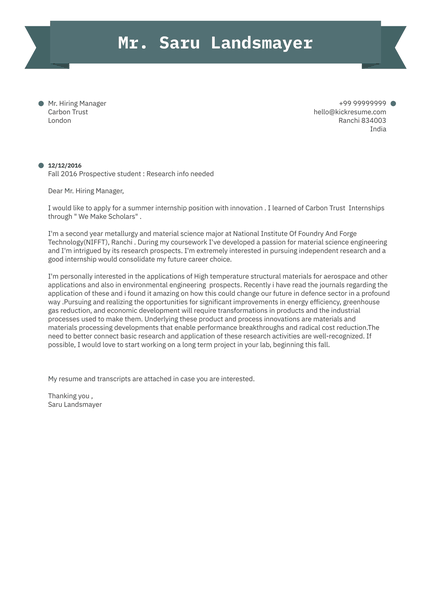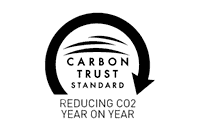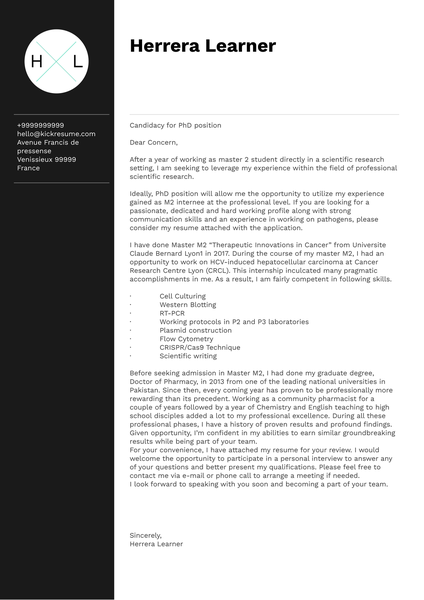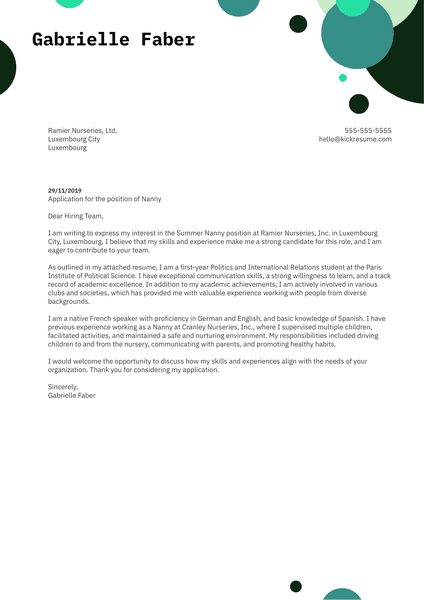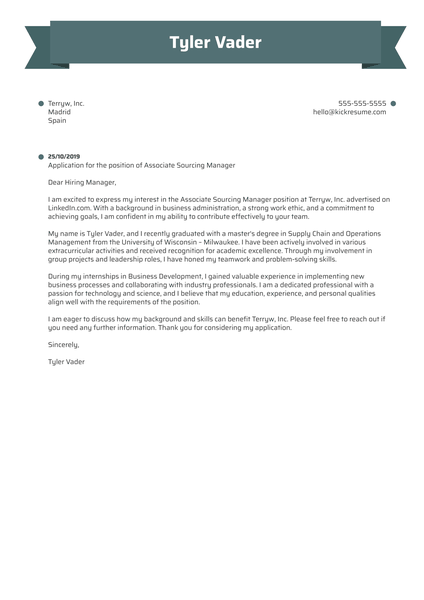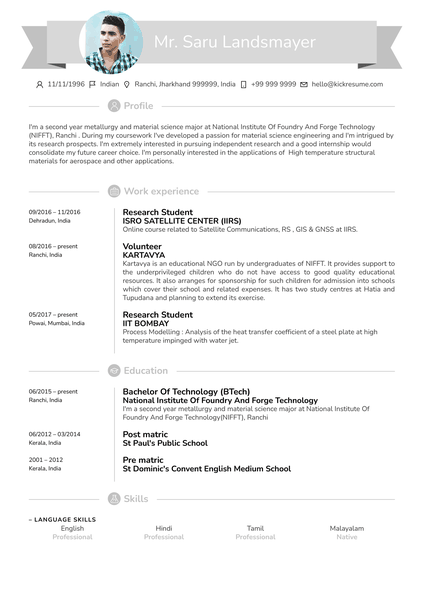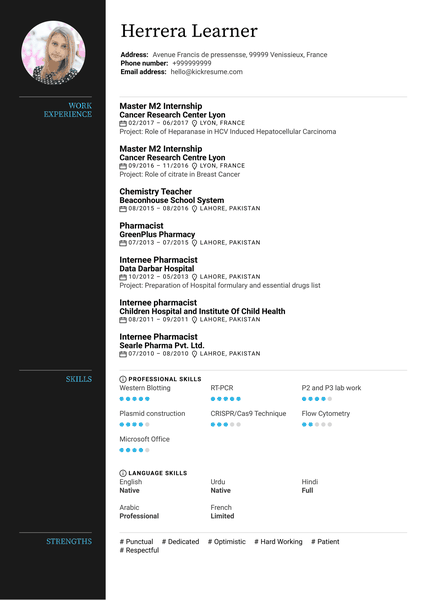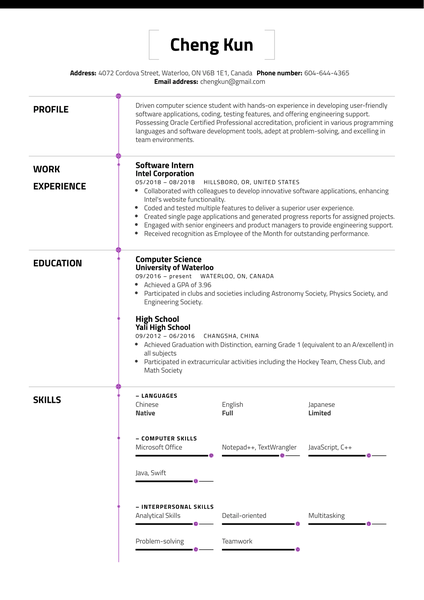When it comes to securing your first job or getting that dream internship, a compelling natural sciences student cover letter is your best bet!
Since you don't have much (if any) professional experience that would vouch for your abilities, you have to convince employers to give you a chance. Learn how to do exactly that with our guide, brimming with customizable templates, real-life cover letter samples, writing tips, and plenty of examples to go around. Let's start!
Keep reading to learn all about:
- How to format your natural sciences student cover letter header
- Why you should personalize the greeting of your cover letter
- What to say in your natural sciences student cover letter introduction
- Ways to showcase your top qualifications as a natural sciences student
- How to conclude your cover letter effectively as a natural sciences student
- Where to look for job opportunities for natural sciences students
1. How to properly format your natural sciences student cover letter header
To begin writing your natural sciences student cover letter, the first essential step is to create a header.
A cover letter header serves many key purposes, including providing your cover letter with a visual structure and immediately sharing your name and contact information with the employer.
In your header, you should always include:
- Your name and professional title (in the case of an applicant who is still in school, you can include “Student” in your title to let employers know you are still completing your degree)
- Your professional contact information
- The name of the company or employer you're applying to
Your header should be located at the top of the document, aligned either to the center or lefthand side.
Here is a good example of a well-formatted natural sciences student cover letter
Henry McMiller, Natural Sciences Student
(123) 456-7890 | johndoe@email.com | linkedin.com/in/john-doe
To: Greenway Laboratories
1234 Street Address
Greensboro, NC
2. How to personalize the greeting of your cover letter
For employers who are hiring students, the pool of applicants can become quite large in a short amount of time. This can lead to many repetitive letters that fail to stand out to the employer.
To make your cover letter memorable, the key is to personalize it.
Personalizing a cover letter requires you to read up on the company beforehand, learning key details about the company’s goals and current projects. You should also try to uncover the person at the company who is in charge of hiring and create a personalized greeting that addresses this person by name.
Here are 3 examples of personalized cover letter greetings
- Dear Head Scientist Joshua Pollard,
- Dear Mr. Joshua Pollard,
- Dear Hiring Manager James Jackson,
3. How to write a strong natural sciences student cover letter introduction
Once you've completed your research to use for personalizing your cover letter, you can begin writing your introductory paragraph.
The primary purpose of this paragraph is to provide the employer with one to two of your best qualifications that you believe will hook their attention and keep them reading. Important information to describe in your introduction can include:
- A concise summary of your professional and/or academic history
- Your specialized area(s) of expertise
- A statement on why you are a good fit for the position
Here is an example of a strong introductory statement from a natural sciences student cover letter
Dear Head Scientist Joshua Pollard,
I am a senior and soon-to-be graduate of the University of North Carolina at Chapel Hill, with an in-progress degree in natural sciences. During my junior year, I interned at your laboratory for six months, where I learned many invaluable skills and built meaningful professional connections with your team. I am now seeking a long-term position with your lab where I can continue to grow my skill-set and work with your talented team of scientists.
4. How to showcase your top qualifications as a natural sciences student
With your introduction successfully written and out of the way, you can start crafting the body paragraphs of your natural sciences student cover letter.
A cover letter should generally have between 2 to 4 total body paragraphs that offer more in-depth explanations of your most relevant skills and accomplishments. Remember to use short sentences and bullet points when possible to keep the information well-organized and easy for the employer to skim.
Here are 6 examples of skills to describe in a natural sciences student cover letter
- Laboratory safety practices
- Collecting and analyzing data
- Research methods
- Practical science
- Presentations (developing, creating, presenting)
- Communication (always describe your style of communication)
Here is an example of how to describe an accomplishment in a natural sciences student cover letter
As a student of the natural sciences, I have worked for more than two years as lab assistant at my university. During my time in this position, I have assisted professors in five major research projects, including three that earned me publication credits. Additionally, I implemented a new lab safety system that reduced clean-up time by 15% on average.
5. How to conclude your cover letter effectively as a natural sciences student
You’ve made it to the end of your natural sciences student cover letter — but the work isn’t done just yet.
To finish off your cover letter strong, you need an effective conclusion that includes:
- The best time and days to contact you
- The best method for contacting you
- How and when you plan to follow up
- When you would like to hear back from the employer
- A formal sign-off
Here is an example of an effective conclusion from a natural sciences student cover letter
Thank you for taking the time to read and respond to my cover letter and application. I am beyond thrilled to be considered for this position and look forward to speaking with you directly about this opportunity. You may best reach me to schedule a meeting any weekday between the hours of 7 a.m. to 4 p.m., or from 12 p.m. to 4 p.m. on weekends.
I hope to hear from you by next Friday afternoon. If I have not heard back by then, I intend to touch base via phone call regarding my application the following Monday.
Appreciatively,
[Applicant Name]
If you've ever wondered how a cover letter differs from a resume, this article will tell you everything about the key differences between the two.
6. Valuable job search resources for natural sciences students
Competing for job opportunities with experienced professionals is near impossible! That's why you should know where to look for opportunities that correspond to your career stage. For example, you can start by looking at these resources:
- Job boards for freshers: Websites like WayUp, Handshake, Prospects.ac.uk, or JobTeaser help students find their first job or internship worldwide.
- General job search platforms: Next, you should look at websites that aggregate job postings from all industries such as Indeed, Glassdoor, or LinkedIn.
- Professional associations: Professional associations, such as the American Chemical Society (ACS), the Geological Society of America (GSA), the Society of Physics Students (SPS), offer internship opportunities that can later turn into a full-blown career.
- Research institutions: Or, you can go straight to the source and look at official websites of institutions that conduct research in your area of interest. For example, the Natural History Museum, the Smithsonian Institution, and the Scripps Research Institute.
- Specialized publications: Going head-to-head with other job candidates without keeping up with current research findings, latest developments and news is a bad idea. Keep an eye on media like “Cell,” “Journal of Experimental Biology,” and “Physics Today.”
- Continuous learning: While university programmes are great for gaining factual knowledge, some job positions may require you to have some type of soft skills too. With online learning platforms like Coursera, edX, Udemy, or Khan Academy, you can target your weak spots.
Apart from these resources, don't forget to also pay a visit to career centres of your university departments, since they often collect job postings from affiliated institutions.
Natural Sciences Student Cover Letter FAQ
How can I convey my passion for the natural sciences in my cover letter?
Since you don't have professional experience yet, your enthusiasm and motivation for the role will have to carry you for now. You can share a brief personal story that inspired your choice of study or describe the most fulfilling aspect of your scientific education or research experience. Discuss how your passion motivates you to pursue further research and your long-term career goals in the field.
How can I make my cover letter stand out from the competition?
The surest way is to personalize your cover letter for each application. Research the institution or company you're applying to and mention any specific projects or areas of research that interest you. Then, you can explain why you're suited to contribute to these projects, perhaps by drawing on your own specific research experiences or academic achievements.
What are common mistakes to avoid in a natural sciences cover letter?
Some of the most common mistakes include: a lack of specificity, typos or grammatical errors, and a tone that is too casual. To counter these issues, make sure to proofread your cover letter multiple times or have it reviewed by our AI-powered cover letter writer to catch any errors. Also, ensure that the cover letter adheres to professional standards in terms of format and language.
What about teamwork and collaboration skills. How do I showcase those?
You can do that by simply describing specific instances where you worked effectively within a team. Mention any interdisciplinary projects or research groups you've been part of, detailing your role and the outcomes. For example, you could discuss a time when you collaborated with peers from different scientific backgrounds to complete a research project, highlighting how your contributions helped achieve a successful result.
Is it OK to mention my academic achievements or awards in my cover letter?
Not only is it OK, it's vital! Academic achievements and awards can set you apart from other candidates, vouching for your dedication and excellence in your field. Briefly mention any scholarships, awards, or recognitions you have received that are relevant to the field of natural sciences. Be specific about why you received these awards and how they relate to your professional capabilities and interests.

